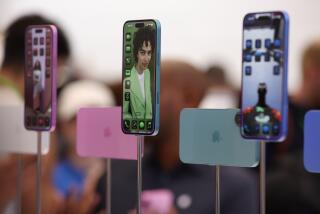For All Our Sake, Apple Had Better Figure Out How to Keep on Growing
- Share via
Let’s just get one thing straight: No matter which computer you use, you have a big stake in whether or not Apple Computer has confounded the doubters and turned the corner on long-term health.
Here’s why:
* Diversity. Monopoly leads to some of the worst tendencies in human and corporate behavior--primary among them mediocrity, price-gouging and arrogance. Apple may be a thin reed against Microsoft hegemony, but it’s among the few technologies that keep the possibility of choice alive.
* Innovation. Apple has always been the best prod against complacency in the Wintel PC world. From the graphical user interface to QuickTime multimedia software to the easy-open design of the new G3 desktop computers, Apple has routinely forced the entire PC industry to improve.
* Fun. My 10-year-old son says the iMac has the “I want that!” factor. How many desktop PCs elicit that from a schoolkid? Take away Apple and we’re left with an awfully gray Wintel world.
Given its run of great news lately, is the Apple death watch over for good? I’ll weigh the evidence, but first a word to the Mac faithful: Relax. For the next 12 months, nothing too terrible will happen.
In the last 18 months, interim Chief Executive Steve Jobs has streamlined ponderous product lines, cut acres of dead wood and delighted skittish investors with five consecutive profitable quarters and a steadily rising share price.
Apple regained its footing in the fast-growing market for low-cost PCs, with iMac seizing more than 7% of the retail market--hardly world domination, but amazing for a company that was rapidly sinking into irrelevance.
With the promise of a vastly superior Mac OS X late this year and a nearly complete refreshing of its hardware products (lacking only the eagerly awaited consumer portable), the Mac is back.
Apple has also wooed back critical game designers with its newly unveiled G3s. And the announcement last week of a Mac-only software application from Connectix that makes your Mac a virtual Sony PlayStation was a brilliant stroke.
After years of sleepwalking, Apple has retaken the high ground of innovation.
It would take unimaginable blunders to stall such momentum in 1999. But the new millennium looks hazier.
Jobs’ heroics and charisma brought back Mac loyalists in droves, but to be a long-term force in computing, the company must convert Windows users.
Apple needs a few hundred thousand like Brian Paine, a 25-year-old PC support tech for the Nordstrom department store chain.
“The PC is just my stepping stone to get here,” he said, pointing at an iMac on the show floor at last week’s Macworld Expo in San Francisco.
Apple has made modest inroads toward bringing in more converts. Its research suggests that 6.5% of iMac buyers in October through December were Windows converts. The same percentage already own Windows machines and added an iMac as a second machine for themselves or, more likely, for Grandma or little Katherine.
Apple officials say 32% of iMac buyers are new users--if true, that’s an even more impressive figure.
*
No matter how great the new Macs are, don’t expect Windows conversions to come from the business world, still the biggest market for PCs. Apple’s pretty much given up on business outside its publishing niche.
The Mac OS X Server--a new software program for central computers that can send separate video streams to 50 iMacs simultaneously--is a case in point.
In a defensive move to keep Windows machines out of the rapidly dwindling number of Mac-only businesses and schools, the OS X Server doesn’t support Windows computers. So it does nothing to help businesses justify keeping the Macs they do have or becoming a mixed-platform shop.
Kim Brown, an analyst for Dataquest in San Jose, wonders why Apple doesn’t sell a disk-less iMac to schools for $800; those iMacs could run completely off the server, creating the best kid-proof network PC on the planet.
The new G3 machines are built out of polycarbonate, “the same stuff they build bulletproof vests out of,” Jobs quipped at Macworld. That’s good, because the competition won’t be firing blanks.
“The iMac was a great wake-up call for the industry,” Intel Senior Vice President Paul Otellini said last week. He predicted that a raft of low-priced PC knock-offs with LCD screens would be ready this fall.
Apple faces an irresistible force: Among the top retail systems in November, eight were PCs priced well below that of the iMac. Apple can’t fight the trend forever.
Finally, the Mac OS, Apple’s historic difference and fundamental contribution to the world, is less and less important in a Web-centric world. The browser-mediated experience is gradually overshadowing both Windows and the Mac OS.
Microsoft understands this too well. It has Internet Explorer, plus Windows CE and WebTV, for a panoply of new hand-held computers and Internet appliances. Apple may need a partner--a senior partner--to survive in the coming world of “everywhere” computing.
So for Apple in the long run, it comes down to a simple law of market capitalism: Grow or die. And for everyone’s sake, it better figure out how to keep growing.
Times staff writer Charles Piller can be reached via e-mail at charles.piller@latimes.com.






